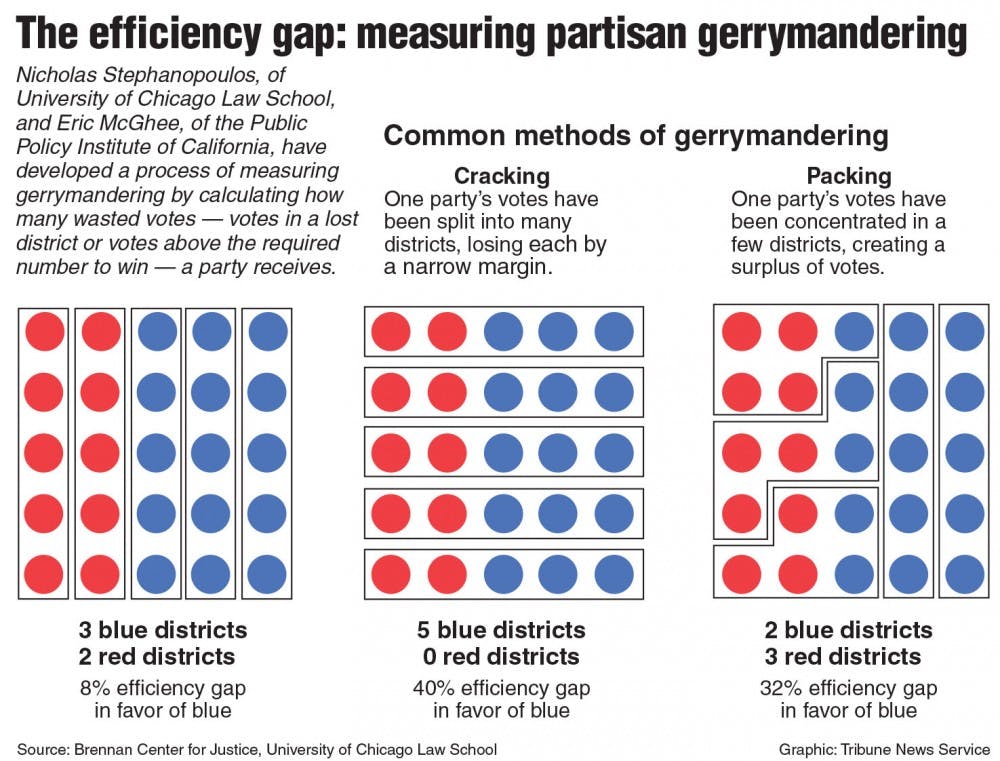With five bills filed in the Indiana General Assembly, redistricting reform is set to be a much-debated topic this session.
Currently, every 10 years, Indiana legislators redistrict the state. The next time Indiana will be redistricted is 2021, only four years away. Lawmakers in both parties, with support from grassroots organizations across the state, want to see a change in the way it’s done before then.
Senate Minority Leader Timothy Lanane, D-Anderson, and House Minority Leader Terry Goodin, D-Austin, have both spoken on the importance of redistricting reform numerous times since the start of the session two weeks ago.
Their goal is to stop partisan gerrymandering, the political practice of drawing district lines to keep the majority party in power.
“As I have said before, we have turned into a state where the lawmakers select their constituents rather than the other way around,” Goodin said at the legislature’s first session Jan. 3.
Lanane filed Senate Bill 77, which would establish an independent redistricting commission to recommend plans for redrawing the general assembly districts and congressional districts. Currently, Indiana legislators decide how the districts should be redrawn.
In his response to last Tuesday’s State of the State address, Lanane said he was disappointed Gov. Eric Holcomb didn’t address redistricting in his speech.
Goodin agreed, saying he thought he saw bipartisan support for redistricting on both sides.
Another important bill regarding redistricting reform is Senate Bill 326, authored by Sen. Greg Walker, R-Columbus. Walker’s bill focuses on changing the standards for which districts are redrawn.
Julia Vaughn, policy director for Common Cause Indiana, supports Walker on this bill. Vaughn works with Common Cause to educate citizens and to lobby state legislators on important election-related issues.
She said redistricting reform can be fought on two fronts: who and how. Walker’s SB 326 focuses on the “how” piece.
“Not all districts can be all the same things at all the same times,” Vaughn said.
Currently, the only two criteria Indiana must follow when redistricting are keeping the districts relatively equal in population and continuous, meaning they do not end and start in another part of the state.
Vaughn, however, also wants to see districts that offer political competition and that are compact, meaning they are easy to get around.
Currently, lots of districts are shaped the way they are because it ensured political victories for the majority party during the last redistricting.
Gerrymandering can be done in two ways: packing or cracking.
Packing occurs when a majority party tries to pack as many people from the minority party into as few districts as possible. This would ensure that there are as few minority districts as possible, IU political science professor Marjorie Hershey said. Cracking occurs when a majority party takes the minority group and breaks them up, putting small amounts of a minority party in multiple districts, so that they never win a district.
Vaughn wants to implement legislature that would eliminate these unfair practices.
“Lots of gerrymandering means lots of safe seats,” Vaughn said.
Vaughn also wants to see a change in who redistricts the state. She said she wants to work to create an independent panel where citizens work to redistrict the state.
Since legislators are currently involved in the process, it’s likely they are going to try to recreate the districts that got them elected in the first place, Hershey said.
There’s nothing necessarily wrong with that, she said, but it can lead to unfair elections for minority parties, since legislators can redistrict the state in their party’s favor.
Vaughn and Common Cause are working to pass legislation that would create an independent panel where citizens redistrict the state.
This would make the redistricting process diverse and clear of conflict of interest, Vaughn said.
She added she hopes to see a reform that allows for a commission with multiple party viewpoints. This would lead to a diverse view of redistricting.
As well as supporting SB 326, Vaughn said she would support a bill similar to Senate Bill 159 to change the “who” part. SB 159 would create an independent commission that would have four legislative representatives and five citizens, chosen from a pool of applicants.
Vaughn said she recognizes the legislature won’t change redistricting laws all at once. This session, however, she said she’s hoping the general assembly passes legislation that would focusing on the “how” piece of redistricting reform. Then, next session, she can work to reform the “why” piece.
One of the biggest problems with gerrymandering is that minority parties and their issues don’t get heard, Vaughn said. When voters don’t feel their voice is being heard, voter turnout decreases.
Vaughn said too many districts have only one name on the ballot, and when a voter doesn’t agree with that name, they may feel there’s no reason for them to vote.
Voters end up feeling disempowered and dissatisfied, she added.
“Democracy is at stake if you can’t hold your officials accountable by elections,” Vaughn said.



